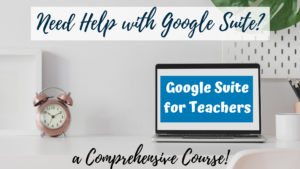
Distance Learning: Supporting Math Students
Distance Learning has provided me with so many new challenges that I feel like everyday is a new adventure. I am in my seventh year of teaching, sixth year with the same co-teachers, and I really was beginning to feel like I knew what I was doing, and then BAM! Coronavirus…
Here are some tips as to how I support my inclusion students in math during this period of hybrid learning.
Reference Sheets
I use reference sheets in math all the time. But I feel like they are a great tool to keep posted on Google Classroom, or other online platform for the students to keep referring to.
Reference sheets are tools that I use for math that provide the kids with reminders of how to do something and provide them with sample problems. I find these are super convenient when I’m teaching solving equations, but I do use them for all topics.
All Quizzes Taken in School
The teachers that I work with love to do tests and quizzes on the days that the kids are working from home. Their logic is that they want to use all the time that the kids are in school for instruction and remediation so let’s find a way to have the kids take quizzes at home.
Well I went along with this for about a week. Every test or quiz my students took at home, especially in math, they bombed.
When the students are working from home, I can not effectively provide them with their IEP accommodations. I can not make sure they are in a good setting, I can not make sure that they have access to the reference sheet.
The other thing that I did was I do not allow my students to take math quizzes on Google Forms. The math teachers thought this would make grading easier. But, what I’ve found is that when my students are given a multiple choice Google Form quiz, they are more likely to just guess at an answer instead of trying to solve the problem.
Master List of Work
Every morning I make a master list of all the work the students need. I share it in a public place and make it available to all students, not just the ones on my caseload. Even though Google Classroom has a way of showing the kids all their work in one place, for some it’s still confusing. So every day I spend the first 20-30 minutes of my day compiling a list of all the work and sharing it.
Organization is challenging for students, not just students with executive functioning deficits. Doing this one small thing for them can help them have a place to check their agendas against.
Constant Parent Communication
My biggest tip for distance learning in general is to stay in contact with your parents. There are so many issues that can be prevented by getting in touch with the parents and fixing small issues before they become big issues.
Parent communication can be scary, but usually once you bite the bullet and call, you can fix the issue and everyone feels better.
This time is very stressful for all of us, be kind to yourself.
Also, Check Out:
FREE co-teaching checklist

Subscribe to receive a free co-teaching checklist!






